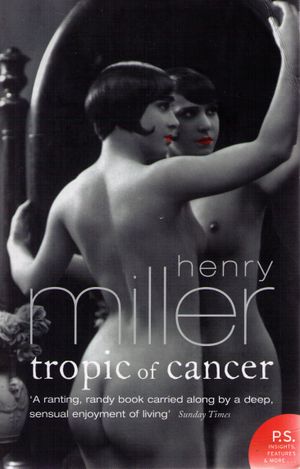Foreword to The End of Obscenity
The book in your hand is a quiet and essentially modest account of a legal revolution led by a few determined and extraordinary publishers. When I think of Barney Rosset and Walter Milton, I am reminded of the instant of Civil War generals: Sherman and Grant race to the fore. They are men who are determined to take a hill even if it takes all summer and chews up half of their resources. It was thus Minton’s and Rosset’s good fortune to have on their side one of Lee’s lieutenants, a Light Horse Harry, named Charles Rembar, and the purpose of this forward is not to take up the arguments of the book, but rather to relive its modesty with an account of the author. Light Horse Harry was a great cavalryman, and his strategy and tactics were bold, luminous, witty, and exceptionally well-balanced, but men endowed with the combative graces do not often write about themselves. So I will repair the lack of personal memoir and give you an introduction to the author.
He is my cousin, Mr. Charles Rembar, the son of my mother’s oldest sister, and he is the closest to an older brother I will ever come. Since he is eight years older than me (although I fear he does not look it), he was very much an older brother through my childhood, and I worshipped him (with enormous funds of love and envy) because he was a hero. He was one of the few people I’ve ever known who had a happy look on his face when he came to bat in the late innings with men on base, his side behind, and the need for a homer prominent in everyone’s head. Indeed he had his smile because it was slightly better than even money he was going to hit that homer. In fact, he would. This is not hyperbole. If I saw him in a hundred baseball games, there must have been fifty late-inning spots of exactly the sort I describe: he probably hit thirty-six homers out of fifty. In fact, we usually didn’t believe it if he didn’t give us our expected spark of apocalypse when the ball rocketed over the centerfield’s head. Often as not, Cy Rembar’s homers would land in the tennis court at the end of our playing field, for that after all was the place where he would pull out all the winning sets from all the tennis players who were more trained than he, more devoted, more fanatical and less humorous. Ditto for football. Ditto for getting the best looking girls. Because of Cy Rembar, I used to believe in Jack Armstrong.
Those were Depression years. Much gloom abounded in everyone, but he was the bright spot, man. He was the only figure I encountered in my childhood who seemed to believe it was more natural to win than lose and that life was therefore to be enjoyed rather than decried.
Since then, he’s gotten a little older, not a great deal so far as I can see, and it’s a shock to realize I’m as tall as he is today and weigh — I do not brag of this — thirty pounds more. But he’s still the one man in all the world whose opinion is gold to me, because Rembar is not only a winner, but a man with a subtle moral force. While he was never religious, probably never will be, and so far as I know evolved no elaborate set of ethics other than a profound respect for the law which served to house the architecture of his ability to reason, that particular ability in him precisely to reason has become a force which approaches the power of a mighty muscle, for in close tactical argument and debate on any subject impoverished at the drop of a coin, he is doubtless one of the world’s best and most brilliant quick reasoners. Which is to say he can be as bad as a boil on the royal behind if he beats you in a tactical brush on your favorite theme. But I have been led astray by Rembar’s annoying power to reason. I was speaking of his moral force. It comes, I suppose, from a reliance on taste, a sort of implicit sense that manners, if they are excellent enough, can serve as a substitute for metaphysics. (Doubtless, they so serve because exquisite manners call upon that reservoir of natural grace and animal philosophy which existentialists like myself are always trying to chart.) No matter how, he’s a modest moral force in any room in which he finds himself because he’s a clean man, and looks for clean issues to complex problems, and does it with good will. Consider what a recommendation is this when the man has been my lawyer for twenty years and charges solid fees. But it is true. He looks for moral issues in his activities. And still plays baseball. And still might take a girl away from me if he chose to. Although I hope the odds have closed.
And I take pleasure in this book by him because I had a little to do with the commencement of his interest in these problems, yes, back years ago with The Deer Park, and years before, we used to argue (since it was a matter of direct moment to me) about the defense of serious works of literature which were on the face of their language or situation obscene, and I used to fulminate against those thumbscrews of the law which required the defense to engage respectable witnesses who had then all but to perjure themselves in order to swear that the particular erotic work was moral and aroused them not at all. I would cry out, “Why can’t a novel just once be defended as erotic and valuable as well?” and Rembar would give me a short lecture, most clearly presented, about the subtle if sometimes retarded relation of the law to reality, and how perhaps the time was coming.
Well, it has come. A war has been won. Writers like myself can now write about any subject; if it is sexual, and we are explicit, no matter, the American writer has his freedom. We can all congratulate ourselves.
He is, however, as I would remind you, a moral man, and so I was pleased to see as I read through these pages that he is troubled just a hint by the liberties won, just indeed as I am troubled. For back of the ogres of censorship and the comedies of community hypocrisy, there still rests the last defense of the censor, that sophisticated argument which might urge that sex is a mystery and men explore it and detail it and define it and examine it and eventually disembowel it of privacy at their peril. It is the argument of tradition against the power of reason. Rembar — we will repeat — personifies the positive attractions of the life of reason, but he is sufficiently instinctive as a gent to waste no time congratulating himself on heroic victories. Like the noblest (one revenges oneself on an older brother by drowning him in superlatives) yes, like the noblest of Lee’s Lieutenants, he wonders privately with concern if his cause is altogether just. So, too, do I. It is my cause as well. And like many another American writer, about to embark on a literary trip through some of the aesthetic territory Rembar’s cases have helped one to enter, I brood too about undue exposure of the mystery, and console myself with the second argument — that the inroads of science and industry, advertising, bad art, industry and commerce, also invade the mysteries of existence. And thus the poet must be there as well to trim the lamp and anoint that numbing of the flesh which serves the technician’s electrodes and probes. The novelist may help to sink the ship of sex before all is done, but it might be even worse without a literary exploration or two. For next to the mystery is the disease. It is the disease of the twentieth century, that ill so ubiquitously spawned by the anomalies of reason and the maceration of instinct, all the promiscuous pills of all of that labyrinthine and technological vat. So when I question the value of the inquiry I would make and, repeat, now have via Rembar, Minton, Rosset, and some others, yes, now have real freedom to make. I lave the edge of my doubt with the certainty that some one of us artists must manage to be there to arrest the doctor when he also marches into the door of the mystery. Because the doctor takes flash bulbs into the womb, whereas we — if we are good enough — will take the herbs of some of the good words and balm the helpless exposure of the girl with aromatics and spice. Perhaps life continues on a certain irreducible minimum of art. Without that, no life. That is the modus operandi of the advocate whose opinions and deeds you are now ready to encounter. Welcome to my racket, Cousin Cy, Gentleman Sword.



